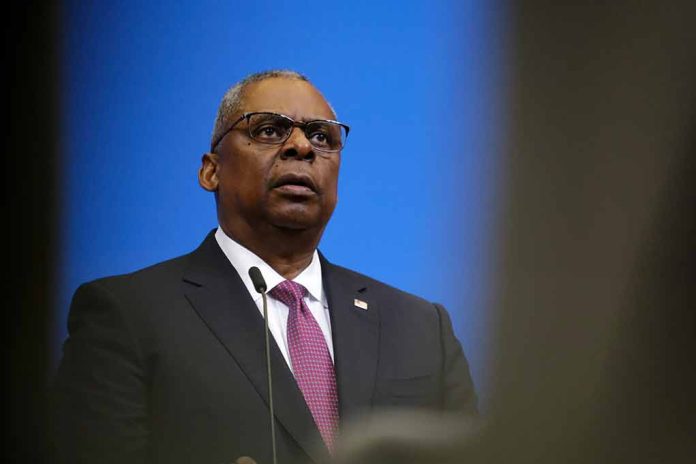
In the high-stakes world of national security, every decision made by our top brass carries weight. But when Secretary of Defense Lloyd Austin recently found himself at the center of a storm over military protocols, it wasn’t just the Pentagon holding its breath. Patriotic conservatives, always vigilant about the integrity of our armed forces, had their eyes glued to this unfolding drama. Buckle up, folks – we’re about to dive into a tale that’s more twisted than a pretzel at a White House dinner party.
The Hospitalization Controversy
Secretary Austin’s recent hospitalization for complications from prostate cancer surgery has sparked a firestorm of debate about military protocols and chain of command. The controversy stems from the fact that Austin did not immediately inform President Biden or other key officials about his hospitalization, raising questions about transparency and decision-making processes at the highest levels of the Defense Department.
The incident has prompted calls for a review of notification procedures and accountability measures within the Pentagon. Critics argue that the lack of immediate disclosure could have potentially compromised national security, while supporters of Austin maintain that proper protocols were followed once the severity of his condition became apparent.
Defense Secretary Lloyd Austin revoked a plea deal reached with the accused mastermind behind the 9/11 terrorist attacks and two other accomplices.https://t.co/En3b6e91Ik
— ABC 33/40 News (@abc3340) August 4, 2024
Ethical Considerations and Chain of Command
The situation raises important ethical questions about the balance between personal privacy and public responsibility for high-ranking government officials. As Secretary of Defense, Austin holds a critical position in the national security apparatus, and his ability to perform his duties directly impacts the safety and readiness of our armed forces.
“The American people deserve to know that the chain of command for our military and nuclear arsenal is clear, transparent, and effective,” said a senior defense analyst familiar with the situation.
The Pentagon has since implemented new notification procedures to ensure that the White House and other relevant parties are promptly informed of any health issues or absences affecting top defense officials.
Implications for Future Policy
This incident has broader implications for how the Defense Department handles sensitive information and maintains operational readiness. It has prompted discussions about potential reforms to increase transparency and accountability within the military leadership structure.
As the situation continues to evolve, lawmakers and military experts are calling for a thorough review of existing protocols and potential improvements to ensure that our nation’s defense apparatus remains robust and responsive, even in the face of unexpected challenges.
The outcome of this controversy may well shape future policies regarding the disclosure of personal health information for high-ranking officials and the procedures for maintaining continuity of leadership in critical government positions.
Sources
More from Around The Web
DEFENSE SECRETARY RESCINDS CONTROVERSIAL 9/11 PLEA DEAL
WHAT SECRETARY OF DEFENSE LLOYD AUSTIN THINKS ABOUT KAMALA HARRIS
DEFENSE SECRETARY AUSTIN DELIVERS REMARKS TO THE 19TH UKRAINE DEFENSE CONTACT GROUP MEETING
U.S. SECRETARY OF STATE ANTONY BLINKEN & SECRETARY OF DEFENSE LLOYD AUSTIN III













